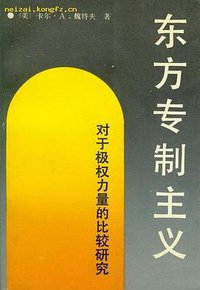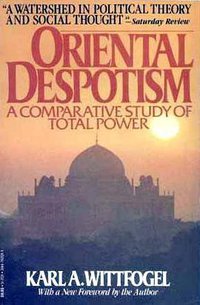Oriental Despotism
Douban
A Comparative Study of Total Power
Karl A. Wittfogel
visão geral
Starting from a Marxist analysis of the ideas of Max Weber on China and India's "hydraulic-bureaucratic official-state" and building on Marx's sceptical view of the Asiatic Mode of Production, Wittfogel came up with an analysis of Oriental despotism which emphasized the role of irrigation works, the bureaucratic structures needed to maintain them and the impact that these had on society, coining the term "hydraulic empire" to describe the system. In his view, many societies, mainly in Asia, relied heavily on the building of large-scale irrigation works. To do this, the state had to organize forced labor from the population at large. As only a centralized administration could organize the building and maintenance of large-scale systems of irrigation, the need for such systems made bureaucratic despotism inevitable in Oriental lands. This structure was uniquely placed to also crush civil society and any other force capable of mobilizing against the state. Such a state would inevitably be despotic, powerful, stable and wealthy. Wittfogel's anticommunism led in "Oriental Despotism" to extend the hydraulic hypothesis to Russia, where it hardly is applicable.
contents
Frontmatter
PREFACE
INTRODUCTION
CHAPTER 1: The Natural Setting of Hydraulic Society
CHAPTER 2: Hydraulic Economy--a Managerial and Gen uinely Political Economy
CHAPTER 3: A State Stronger than Society
CHAPTER 4: Despotic Power--Total and Not Benevolent
CHAPTER 5: Total Terror--Total Submission--Total Loneliness
CHAPTER 6: The Core, the Margin, and the Submargin of Hydraulic Societies
CHAPTER 7: Patterns of Proprietary Complexity in Hydraulic Society
CHAPTER 8: Classes in Hydraulic Society
CHAPTER 9: The Rise and Fall of the Theory of the Asiatic Mode of Production
CHAPTER 10: Oriental Society in Transition
NOTES
BIBLIOGRAPHY
GENERAL INDEX
INDEX OF AUTHORS AND WORKS

